Lab Exam 1 Review
1/72
There's no tags or description
Looks like no tags are added yet.
Name | Mastery | Learn | Test | Matching | Spaced | Call with Kai |
|---|
No analytics yet
Send a link to your students to track their progress
73 Terms
this refers to practices that minimize the chance of transfer of microorganisms between a patient and a health care worker
aseptic technique
this term refers to infections acquired while in a health care facility
nosocomial
the pores on most masks used in the health care setting will block droplets and large dust particles but are usually not small enough to block a virus that is not associated with a droplet or dust particle
true
for those working in extremely dangerous conditions the use of this PPE will give them the greatest chance of being protected from air borne pathogens
PAPR
this refers to hospital rooms that are set up so that the air from the hallway flows into the room rather than having the air flow out of the room into the hallway
negative pressure rooms
which is the proper order for donning PPE?
gown → mask → face shield → gloves
when properly doffing contaminated gloves, this should be done with the first glove that is removed
it should be wadded up and placed in the palm of the still gloved hand
a patient has a runny bowel movement that spills on the floor. You are to properly clean and disinfect the floor. Once you have your PPE on, this is the first thing you should do
physically remove as much organic matter as possible
a skin pathogen is shown to be transmitted via direct contact or contact with surfaces touched by an infected person. What measures must be taken to reduce the risk of transmission?
Based off of CDC Principles, step one is cleaning. Physically (through wiping or scrubbing) removing the microorganisms is just as important as the cleaning agents that will be used. The second step is disinfecting. Allowing the disinfect to be on the contaminated surface for as long as the time it says it should be on the label of the disinfect being used.
washing hands before and after putting gloves on is good practice as well
what role do surfactants play in cleaning surfaces?
prevents the organic material from attaching onto the surface. they will interfere with the forces that allow the organic material to stick onto the surface, by doing this it is easier to clean up as well
how many points can be deducted from your final point total for rule violations?
10 points
what happens if you come to lab late?
cannot take quiz and could be barred from participating in lab exercises
where do unnecessary items go?
lockers, shelves, or underneath the back bench in the lab
what are not allowed in the lab?
cellphones, food, or drinks
what is proper apparel for lab?
long sleeves must not be worn (roll sleeves up if worn)
if you have long hair, it must be tied back or covered in a hair net
no open-toed shoes or open-back shoes
no exposed skin between the pants and shoes
the following procedure must be done when entering lab
place nonessential items in the lockers, shelves or beneath back bench
wash lab bench with lysol disinfectant
wash hands
what needs to be done before leaving lab?
equipment must be returned to the place of origin
the clean up checklist must be done
gas bench is turned off
trash is disposed of
chairs are pushed back to the bench
what are considered microbes?
too small to be seen with the naked eye
what are the current recognized domains of life?
bacteria, archaea and eukarya
archae
extremophiles (can live in harsh environments)
smaller than average bacteria
prokaryotic
can be found in minor part of normal flora of the mouth and colon
bacteria
most numerous in the planet
important roles in the nutrient cycles
most have cell walls
peptidoglycan
prokaryotic
fungi
multicellular
eukaryotic
cell wall made of chitin
saprophytic (secrete enzymes that secrete proteins)
virus
do not make ATP
not considered alive
cannot replicate themselves without entering a cell and utilizing the biochemical machinery of a host cell
ubiquity
found everywhere
volume of sphere
4/3(3.14)r3
relative volume
volume of first cell (or virus)/volume of second cell (or virus)
how do you aseptically transfer liquid using an inoculating loop?
flame the loop until wire turns red and let cool
remove top of sterile water
flame opening of the tube
dip inoculating tube into the water and remove a loop of water
flame the tube opening and replace the top
how do you aseptically transfer a measured volume of liquid from one sterile container to another using a serological pipette?
leave pipette in the sterile sleeve until ready for use
open the tube of water and flame the tube opening
draw the water to the “0” mark
flame the tube opening and replace the top
flame opening of your tube when finished putting the liquid into it and replace top
how do you create a fungal garden?
acquire agar plate and write name
find dust covered surface
open plate and place it where you blow the dust from the surface to land onto the plate
give one short puff of breath
close plate and incubate at room temp for several weeks
how do you safety transport a microscope?
lift using two hands, one on the base and one on the arm and make sure cord is wrapped around base before lifting
how do you clean the microscope?
clean stage, objectives and oculars with lens paper and cleaning solution
how should the microscope be left when finished working with it?
remove slide from the stage and dispose of properly
move mechanical stage to its lowest point
rotate the revolving nosepiece so that the scanning objective is in the viewing position
clean stage, objectives and oculars with lens paper and cleaning solution
wind the cord around the base and use two hands (one on base and one on the arm) to place back into bench storage cabinet
how can you adjust the intensity of the light?
voltage regulator
what allows light to be passed through to the subject to be magnified?
iris diaphragm
how do you adjust the position of the condenser?
condenser adjustment knob
alterating the position affects the contrast of what is being observed
base
provides stable platform to minimize the vibration transmitted to the scope
illuminator
light source of the microscope
condenser
system of lenses that focuses the light on the subject to be observed
mechanical stage
the site where the microscope slide is placed
what moves the slide?
stage adjustment knobs
how to move mechanical stage?
two focus knobs on the left and right of microscope
coarse focus adjustment: larger and can only be used with scanning and low power objectives
fine focus adjustment: smaller and should be used with the high power or oil immersion objectives
coarse focus adjustment
larger and can only be used with scanning and low power objectives
fine focus adjustment
smaller and should only be used with the high power or oil immersion objectives
parfocal
switch from one objective to another with very little need to refocus
parcentral
you can switch from one objective to another with very little re-centering of your specimen
scanning objective
4X
red ring
low power objective
10X
yellow ring
high power objective
40X
blue ring
oil immersion
100X
white ring
why do you use oil for oil immersion?
to reduce the amount of image distortian caused by light refraction
coccus

diplococcus

streptococcus
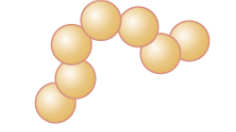
staphylococcus
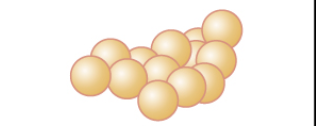
bacillus

streptobacillus

diplobacillus
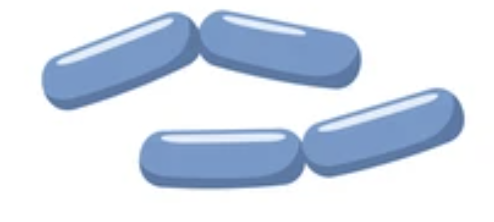
palisades

coccobacillus

vibrio
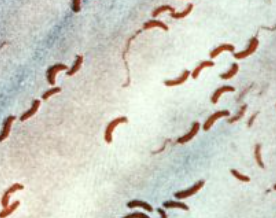
spirillum
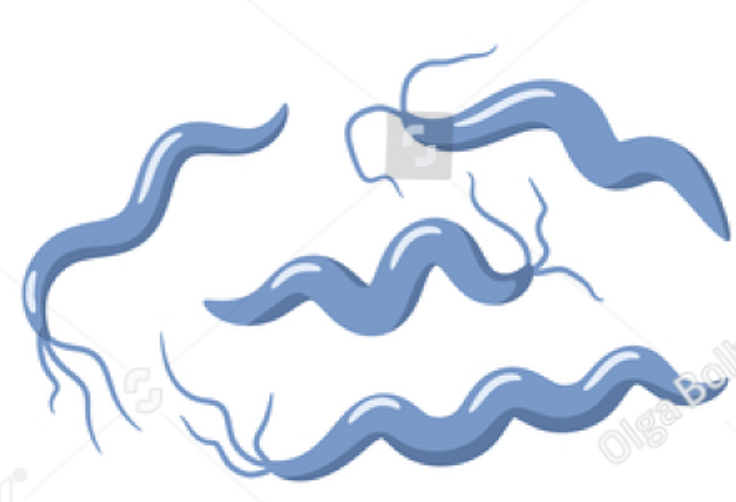
spirochete
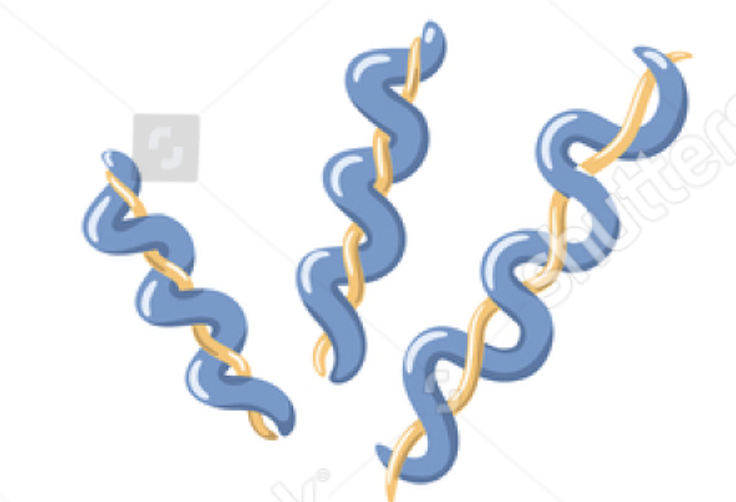
pure culture
consists of cells of one species of bacteria
why is attaining pure culture important?
allows further experimentation to identify the bacteria and determine drug sensitivities
T streak method
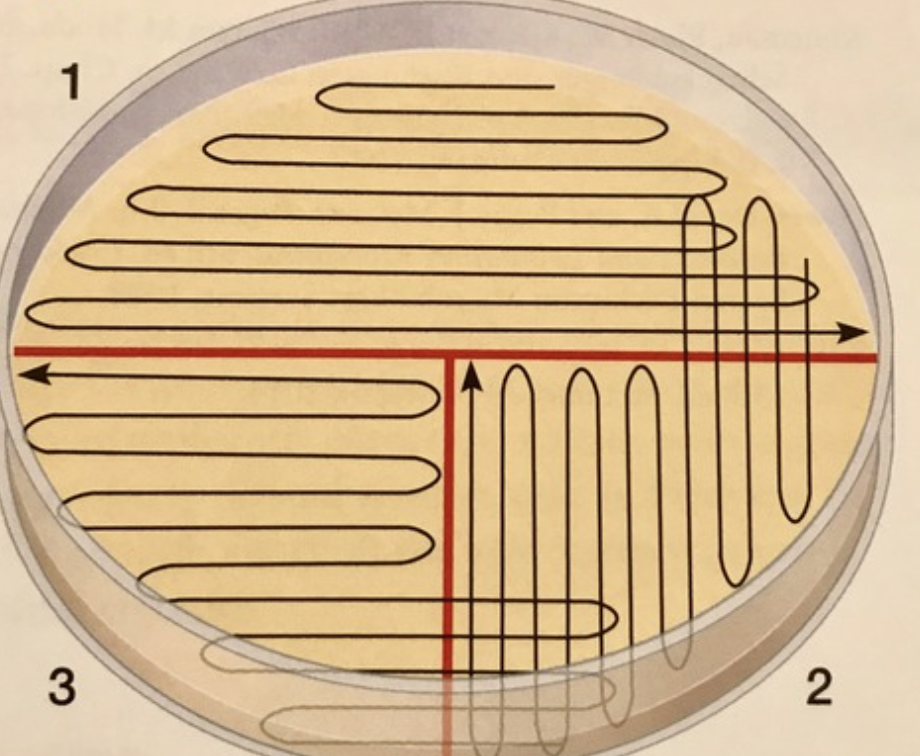
gram positive bacteria
thick, relatively rigid layer of peptidoglycan
teichoic acid
liptoteichoic acid
gram negative bacteria
thinner less rigid layer of peptidoglycan
phospholipid bilayer outside the peptidoglycan (outer membrane)
what does the outer membrane have?
lipopolysaccharides (LPS)
LPS
referred to as a endotoxin, it evokes a strong immune system reaction
what is mycobacterium tuberculosis responsible for?
tuberculosis
a positive staining result will be reported as what?
AFB+
reagents for Ziehl-Neelson protocol
carbolfuchsin → acid alcohol → loeffler’s methylene blue
gram staining reagents
crystal violet → gram’s iodine → ethyl alcohol → safranin